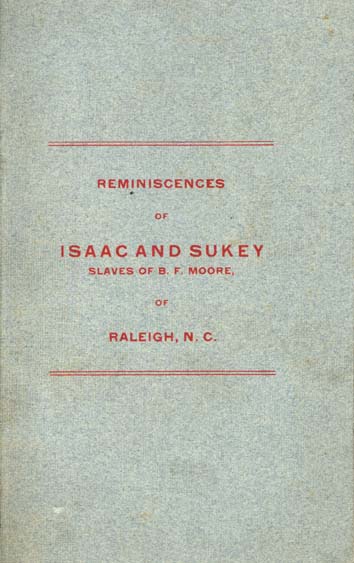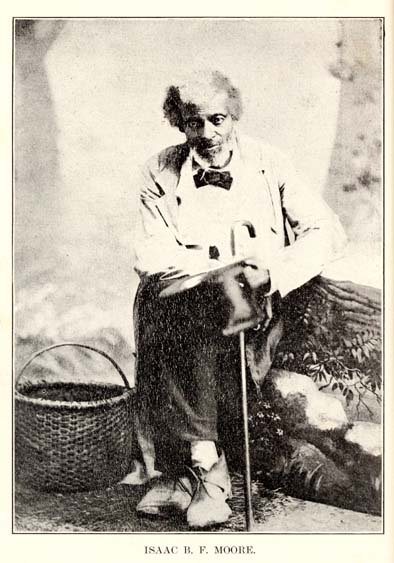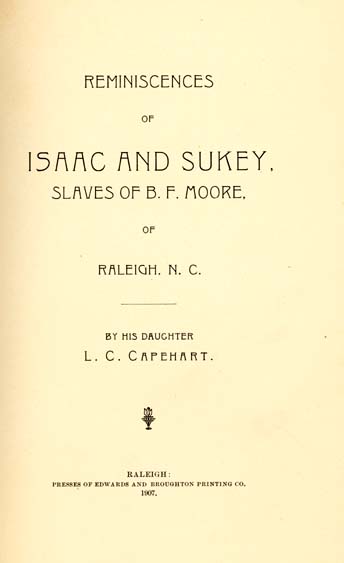Reminiscences of Isaac and Sukey,
Slaves of B. F. Moore, of Raleigh, N. C.:
Electronic Edition.
Capehart, L. C.
Funding from the National Endowment for the Humanities
supported the electronic publication of this title.
Text scanned (OCR) by
Lee Ann Morawski
Images scanned by
Lee Ann Morawski
Text encoded by
Chris Hill and Natalia Smith
First edition, 2000
ca. 20K
Academic Affairs Library, UNC-CH
University of North Carolina at Chapel Hill,
2000.
Source Description:
(title page) Reminiscences of Isaac and Sukey, Slaves of B. F.
Moore, of Raleigh, N. C.
L. C. Capehart
11 p., 1 ill.
Raleigh
Presses of Edwards and Broughton Printing Co.
1907
Call number Cp813 C23 c.2 (North Carolina Collection, University of
North Carolina at Chapel Hill)
The electronic edition is a part of the UNC-CH
digitization project, Documenting the
American South.
This electronic
edition has been created by Optical
Character Recognition (OCR). OCR-ed text has been compared against the
original document and corrected. The text has been encoded using the
recommendations for Level 4 of the TEI in Libraries Guidelines.
Original grammar,
punctuation, and spelling have been preserved. Encountered
typographical errors have been preserved, and appear in red type.
Any hyphens occurring
in line breaks have been
removed, and the trailing part of a word has been joined to
the preceding line.
All quotation marks,
em dashes and ampersand have been transcribed as
entity references.
All double right and
left quotation marks are encoded as " and "
respectively.
All single right and
left quotation marks are encoded as ' and ' respectively.
All em dashes are
encoded as
--
Indentation in lines
has not been preserved.
Running titles have
not been preserved.
Spell-check and
verification made against printed text using Author/Editor (SoftQuad) and Microsoft Word spell check programs.
Library of Congress Subject Headings, 21st edition, 1998
Languages Used:
- English
LC Subject Headings:
- African Americans -- North Carolina -- Raleigh -- Fiction.
- Slaves -- North Carolina -- Raleigh -- Fiction.
- North Carolina -- Fiction.
- Dialect literature, American -- North Carolina -- Raleigh.
Revision History:
- 2000-09-15,
Celine Noel and Wanda Gunther
revised TEIHeader and created catalog record for the electronic edition.
-
2000-07-18,
Natalia Smith, project manager,
finished TEI-conformant encoding and final proofing.
-
2000-07-17,
Chris Hill
finished TEI/SGML encoding
- 2000-07-10,
Lee Ann Morawski
finished scanning (OCR) and proofing.
[Cover Image]
ISAAC B. F. MOORE.
[Frontispiece Image]
[Title Page Image]
REMINISCENCES
OF
ISAAC AND SUKEY
SLAVES OF B. F. MOORE,
OF
RALEIGH N. C.
REMINISCENCES
OF
ISAAC AND SUKEY,
SLAVES OF B. F. MOORE,
Of
RALEIGH. N. C.
BY HIS DAUGHTER
L. C. CAPEHART.
RALEIGH:
PRESSES OF EDWARDS AND BROUGHTON PRINTING CO.
1907.
Page 3
Isaac and the Yankee Officer.
Interview between Isaac B. F. Moore, as he called himself, (taking the name of his former master, a prominent lawyer of Raleigh, N.C.) and one of Kilpatrick's cavalry stationed in Raleigh in April, 1865.]
Isaac lived on the plantation of Mr. B. F. Moore, near the city of Raleigh, now owned by Mr. Bart Gatling. On this farm there was a fine apple orchard. The Yankees were camped in the grove near the "Great House,' as, the negroes called the house in which the white family lived. I give the interview in Isaac's own words:
"One day a Yankee officer tied his ridin' horse to one of de best apple trees in de orchard; de horse he begun to bite de bark on de tree, so I said, 'Mister, dat's a mighty good horse-apple tree your horse is bitin', he will kill it. De Yankee giv me a most sarching look and said, 'You think more of a d--m apple tree dan I do of a man's life.' He stood close to me wid his sharp shooter, his neck as red as any rose, all ready to put my candle out at any minute. You better believe I cased myself away from dar. Arter dat I sed no more 'bout tyin' horses to apple trees."
Page 4
Isaac Before the Mayor for Killing his
Neighbor's Hogs.
One day arter de surrender a gentleman livin' near me got me to watch his field to keep de hogs from rootin' up his 'taters, so when de hogs begun to root I sot my little dog on em, and he fairly tore em to pieces, so de odder man he got mad an' ordered me 'fore de Mare. I went to see my ole marster to git him to pear for me. He wuz a big lawyer, he wus, an' all de folks was 'fraid er him; when he got mad he war er terror, an' er Union man, too, an' cum right out wid what he had to say, an' nobody would kill him, but tother folks was 'fraid. Sum of 'em talked mighty big, but nebber went whar de fight was. But I was gwine ter tell you 'bout dat trial. De time was sot fur ten o'clock, an' when my marster got dar, I was dar too, me an' my little dog. I bring my little dog kase marster want de coat to see him, kase he said no sich dog as dat cud tare all dem hogs ter pieces, as de man said. Well, me and my marster waited an' waited (he had a case in ernudder coat); he was a mity busy man, anyhow, you nebber see him sittin' down doing nuthin'. Marster he kept talkin' 'bout losin' his time, an' arter erwhile de mare he cum in, an' marster he kep' on talkin' 'bout his bein'
Page 5
so late, takin' up his valable time, an' he kept on talking --he fairly charged, didn't, giv nobody else a chance; so, arter erwhile, de mare got up easy an' went out an' soon arter all de odder folks what cum to hear de trial dey went out too. When marster got thrugh talkin' he looked 'round an sed to me, "Well, Isaac, as everybody else is gone, we might as well go too"; and dat wus de las' I hear of dat trial.
Isaac Indicted for Shooting his Neighbor's
Hog.
Er nudder time a man dited me fur shootin' his hog. I went up to de coat house an waited dar a long time. Nobody called my name an' I didn't see marster no whar, so I jes' leaves dar an' goes to look fur my marster. I met him on de street an' I says, marster, I bleeve dey is gwine ter beat us, I think we better peal to Spreme coat. "Nebber mind," says marster, you come back wid me to de coat house. Soon as we got dar a man called out "Isaac B. F. Moore, cum to de stand." I went up an' giv in my evidence, an' I nebber heard no more 'bout dat hog case frum dat day to dis.
Page 6
Isaac and Mars' Ben.
One very hot, sultry day in August, Isaac and his young master Ben went on a fishing trip about twenty miles from Raleigh. After they had traveled several miles conversing pleasantly, as the manner was in those days between master and servant, silence reigned for a few minutes, during which time Isaac was closely observing his surroundings; he soon spied a woodpecker tapping on the bark of a seasoned oak tree. Umph! says Isaac, "dat woodpecker must have a strong constitution to peck a hole in dat tree." He shot at a bird one day and missed him, the bird alighted in a tree nearby, and began to pick himself. "Look at dat rascal," said Isaac, "pickin' my shots out of his back."
One night he was aroused front his slumbers by dreams of burglars. He took his old army musket (True Blue he called it), went out in the yard and shot at what he thought was a man; when he re-entered the house his son said, "Father, did you kill him?" No, siree, but God knows I filled dat ole beegum full of shot."
Page 7
Isaac Rabbit Hunting.
One day Isaac went rabbit hunting. He shot at a rabbit, and was asked if he killed him. "No, said he, "de powder got between de rabbit an' de shots; de shots passed by him, but he smelt de powder an' de smoke, an' you ought to heerd him snort!"
Isaac Voting the Democratic Ticket.
One day I met one of dese highfalutin' nigger women who puts on so many airs; she says to me, "I'm a great mind to shoot you, you ole rascal, fur votin' dat ticket." "Well, madam, if your fingers ken play on de trigger enny faster dan mine, crack a' loose."
NOTE.--He was always a good Democrat.
Isaac Watching his Corn at Night Hears it
Growing.
Dese niggers what don't work kep stealin' my corn out de field, so I says to myself I'll ketch de stinkin' rascal an' have him struck nine thirty on his naked hide; So I takes my True Blue musket, my pistol, my sword, an' my dirk to de field an' hides myself. I watched all de live long night, an' nobody cum, but God knows I neber heerd corn grow so fast in my life. 'Twas nately poppin' an' crackin' all night long!
Page 8
Isaac's Steer in the Mire.
One day "Mars Ben", walking down the street, met Isaac looking very anxious. "What's the matter, old man?" "Dat steer you bought fur me is mired in Mr. Gatling's mill pond an' I can't git him out." "Who have you to help you?" "Well, little John Gatling is dar an' Mr. Taylor. Mr. Taylor ain't workin' any, he jes' doin' de plannin'. We bin tryin' to undermine him, but t'aint no use, for he jis gits deeper and deeper."
Later on the steer was extricated. Marse Ben, meeting Isaac, said, "Well, old man, I hear you got your steer out of the pond; what did he do when he got out, was he much exhausted?" "No, siree; de doggoned old rascal jest went to eatin' grass like dere was nothin' de matter wid him. Marse Ben, don't yon ever buy me ernuther pop-eyed steer, a pop-eyed steer is ungodly. Don't put a bit in all ox's mouth. De Bible speaks bitterly agin it."
NOTE--Mr. James Fontleroy Taylor, the Bard of Rhamkatte.
"Marse Ben, I heerd Miss Lucy was gwine to git married agin'; is dat so?" "Yes, Isaac, she is to marry Mr. Baldy Capehart, and I hope she will be happy, for she is very lonely now." "Bless my soul! I clare to gracious it's a mortification to seriousness!"
Page 9
Sukey's Opinion of her Master's Monument.
Sukey, after the Civil War was over, lived near Oakwood Cemetery. Soon after the erection of a monument to my father, which was surmounted by a bust under a canopy, I came to Raleigh on a visit. As usual, she came to see me, and as she lived near and I had not yet seen the bust, I asked her if she thought it resembled my father. She replied, "It's mity like marster, all but one thing; it ain't got no arms. Marster was such a busy man, always at work, it ought to have arms put to it." "I hope you are getting on well, Aunt Sukey." "Yes, ma'am, I git so full of de Spirit some times you could hear me holler over here (about one mile) if de win' was blowin' de right way. I spect if I eber gits to Heben, de Lord will say, "take Sukey out of dar, for she hollers too loud."
Page 10
Sukey's Husband, Uncle "Toney," and the
Outsiders.
It was customary in ye olden times for gentlemen on horseback, when returning from church, to ride by the side of the carriage and converse with the ladies within. It was quite difficult to keep pace with horses trotting briskly. On one occasion a young lady called out, "Uncle Tony, don't drive so fast, the young men can not keep up." Uncle Tony, whose horses had been ploughing during this week, replied, "Dee horses bin workin all de week, dum horses bin restin all de week; if dum horses can't keep up wid dee horses, dum horses mus' stay behind."
Page 11
Sukey Bat Moore on the Art of Flying.
One summer night about twelve o'clock my mother was awakened by Sukey (who had just returned from a revival) kneeling at her bedside, saying, "Mistis, Mistis, pray for me,--Judy Freeman has got religion and I can't git it." My mother tried to soothe, and promised to pray for her. Later on she gave evidence of having "come through." Not long afterward while in church she felt happy, and began to shout, saying, "Oh! I feel I can fly to heaven!" Some of the sisters said to her, "Aunt Sukey, do try," and under the influence of excitement she really did jump out of the window, and of course fell to the ground; fortunately it was very low and she sustained no injury. One of her friends asked her why she failed to fly. She replied, "I dunno, honey, 'cept as how I didn't git de right flop"!
NOTE--Alluding to the habit of fowls raising and lowering their wings in order to inflate their lungs before flying, which is usually termed flopping.
Return to Menu Page for Reminiscences of Isaac and Sukey, Slaves of B. F. Moore ... by L. C. Capehart
Return to North American Slave Narratives Home Page
Return to Documenting the American South Home Page



